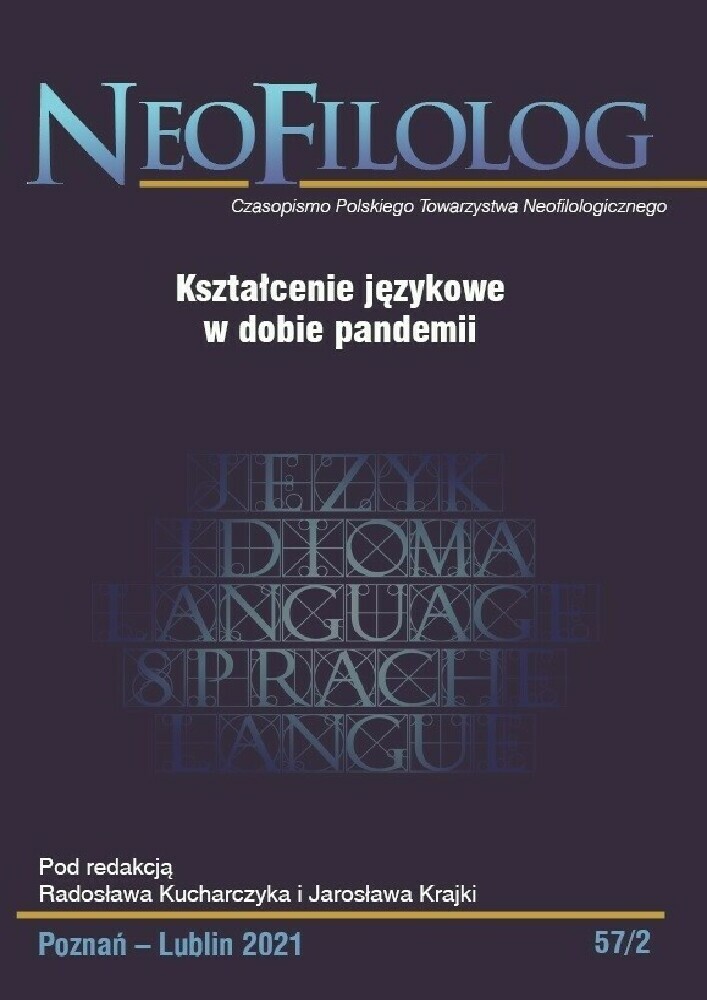Abstrakt
At the beginning of 2020, educational systems around the world faced one of the greatest and most important challenges of the 21st century. Due to the global pandemic and the need to introduce social distancing rules, it was decided to close schools and switch to modes of learning that do not require physical contact between learners and teachers. This decision was associated with numerous problems and difficulties in various areas of school life and the necessity to introduce new rules. More than a year after the introduction of the new learning reality, teachers and students around the world have managed to adapt. International researchers are trying to describe this new order by asking questions about what the school looks like in the time of the pandemic, how students are doing, and what strategies teachers have adopted. The article focuses on research on education and foreign language teaching conducted in 2020 in China, South Korea, Germany, and Poland. The findings to date are combined with a brief description of the educational situation in these countries. Finally, the first conclusions and recommendations are formulated that can be drawn on the basis of data collected by international researchers.
Bibliografia
Buchner A., Wierzbicka M. (2020). Edukacja zdalna w czasie pandemii. Edycja II. Warszawa: Centrum Cyfrowe. Online: https://centrumcyfrowe.pl/wp-content/uploads/sites/16/2020/11/Raport_Edukacja-zdalna-w-czasie-pandemii.-Edycja-II.pdf [access date: 03.05.2021].
Deczewska J. (2020). Interakcje między uczestnikami nauczania zdalnego – wyzwania, oczekiwania, możliwe rozwiązania. “Języki Obce w Szkole”, 3 (2020), pp. 13–18.
Doucet A., Netolicky D., Timmers K., Tuscano F.J. (2020). Thinking about Pedagogy in an Unfolding Pandemic, An Independent Report on Approaches to Distance Learning During COVID19 School Closures. Online: https://issuu.com/educationinternational/docs/2020_research_covid-19_eng [access date: 13.05.2020].
Gao L.X, Zhang L.J. (2020). Teacher Learning in Difficult Times: Examining Foreign Language Teachers’ Cognitions About Online Teaching to Tide Over COVID-19. “Frontiers in Psychology”, 11, 549653.
Hopp H., Thoma D. (2020). Foreign Language Development During Temporary School Closures in the 2020 Covid-19 Pandemic. “Frontiers in Education”, 5, 601017.
Isphording I. E., Lipfert M., Pestel N. (2021). Does re-opening schools contribute to the spread of SARS-CoV-2? Evidence from staggered summer breaks in Germany. “Journal of Public Economics”, 198, 104426.
Jaskulska S., Jankowiak B. (2020). Jaki obraz szkoły w czasie pandemii COVID-19 wyłania się z badań nauczycieli i uczniów? Wnioski dla bliższej i dalszej przyszłości, (in:) Pikuła N.G., Jagielska K., Łukasik J.M. (eds.), Wyzwania dla edukacji w sytuacji pandemii COVID-19. Kraków: Wydawnictwo «scriptum», pp. 57–70.
Karolczuk M. (2020). Zdalnie realnie. Jak uczymy (się) języków w czasie pandemii. „Języki Obce w Szkole”, 2(2020), pp. 39–43.
Krajka J. (2021). Teaching grammar and vocabulary in COVID-19 times: Approaches used in online teaching in Polish schools during a pandemic. “The JALT CALL Journal”, 17 (2), pp. 112–134.
Mindt D., Schlüter N. (2003). Englisch in den Klassen 3 und 4. Grundlagen für einen ergebnisorientierten Unterricht. Berlin: Cornelsen.
Ministry of Education Republic of Korea. (2020). Responding to Covid-19: Online Classes in Korea – A Challenge Toward the Future of Education. Sejong. Online: https://www.mofa.go.kr/%2Feng%2Fbrd%2Fm_22747%2Fdown.do%3Fbrd_id%3D20548%26seq%3D3%26data_tp%3DA%26file_seq%3D1&usg=AOvVaw0MpOdM7-gm7mpbFWiCeWmm [access date: 10.05.2021].
Peters M.A., Wang H., Ogunniran M.O., Huang Y., Green B., Chunga J.O., Quainoo E.A., Ren Z., Hollings S., Mou C., Khomera S.W., Zhang M., Zhou S., Laimeche A., Zheng W., Xu R., Jackson L., Hayes S. (2020). China’s Internationalized Higher Education During Covid-19: Collective Student Autoethnography. “Postdigital Science and Education”, 2, pp. 968–988.
Ptaszek G., Stunża G.D., Pyżalski J., Dębski M., Bigaj M. (2020). Edukacja zdalna: co stało się z uczniami, ich rodzicami i nauczycielami? Gdańsk: Gdańskie Wydawnictwo Psychologiczne.
Sopata A. (2010). Wczesnoszkolna edukacja językowa w Niemczech. “Poliglota. Edukacja językowa dzieci”, 1 (11), pp. 18–28.
Thaler E. (2017). English and foreign language teaching in the German Gymnasium. “Training, Language and Culture”, 1 (3), pp. 72–85.
Wang Y. (2020). How does the Chinese education system cope with the virus outbreak challenge?. “China Daily”. Online: https://news.cgtn.com/news/2020-02-18/China-s-online-learning-sector-thrives-amid-epidemic-ObnQfU8hfW/index.html [access date: 06.05.2020].
Yi Y., Jang J. (2020). Envisioning possibilities amid the COVID-19 pandemic: Implications from English language teaching in South Korea. “TESOL Journal”, 11 (3), e543.
Yoon D. (2020). South Korea’s Coronavirus Lesson: School’s Out for a While. “The Wall Street Journal”. Online: https://www.wsj.com/articles/remote-learning-in-south-korea-becomes-a-fixture-of-pandemic-life-115996 68494 [access date: 08.05.2021].
Zhu X., Liu J. (2020). Education in and After Covid-19: Immediate Responses and Long-Term Visions. “Postdigital Science and Education”, 2, pp. 695–699
Licencja
Prawa autorskie (c) 2021 Krystian Kamiński

Utwór dostępny jest na licencji Creative Commons Uznanie autorstwa – Bez utworów zależnych 4.0 Międzynarodowe.
Przedstawiany utwór (artykuł) upubliczniany jest na podstawie umowy z autorem i na licencji Creative Commons Attribution-NoDerivatives 4.0 International (CC BY-ND 4.0).
Użytkownicy mają obowiązek podania wraz z rozpowszechnionym utworem, informacji o autorstwie, tytule, źródle (odnośniki do oryginalnego utworu, DOI) oraz samej licencji;
- bez tworzenia utworów zależnych,
- utwór musi być zachowany w oryginalnej postaci.
Uniwersytet im. Adama Mickiewicza w Poznaniu zachowuje prawo do czasopisma jako całości (układ, forma graficzna, tytuł, projekt okładki, logo itp.).

